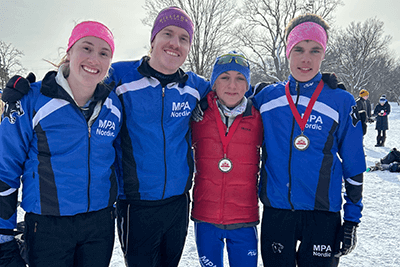October 17, 2025
 Why did I choose to return to MPA to coach?
Why did I choose to return to MPA to coach?
I chose to return to MPA as a coach for so many reasons. First, the coaches I had in high school left a huge impact on me. Dan Ethier and Bev Docherty. It makes a huge difference to have coaches who believe in you, who value you as a student, an athlete, and as a multi-dimensional person outside of MPA, but still push you to be your very best when you compete.
This is what I was blessed to have in them, and I wanted to pay that forward and be a cheerleader and supporter in other people’s lives. Second, I love working with young people. At the time, I had a job without a lot of social interaction, AND there was a pandemic which really restricted the new relationships we formed—I found the team SO energizing to work with. I think for all of us, the ski team (both the camaraderie and the training regimen) became a real source of uplift every day. Relatedly, I love a challenge! Learning to ski is hard, and so is teaching it.
What does it mean to me to mentor the next generation of student athletes?
To mentor the next generation of athletes feels like the least I could do—my own experience as a Panther athlete left such a significant impact on me. I felt honored to endeavor to bring about personal growth, facilitate friendship, and help students hone their abilities.
How did my own experiences as an MPA athlete shape my approach to coaching?
As I mentioned in my earlier responses, I never felt limited by my coaches. If I wanted to spend the entire summer camping in the Boundary Waters, a coach never said, “That will make you slower.” They may have said, “We’ll have to adjust your training, because you won’t be showing up with the summer running under your belt.” The same type of encouragement and accommodation existed with school work, music, pottery, and anything else I pursued.
This approach led me to be very empowered, taking ownership of my training. Carrying this approach forward was central to my coaching. I wanted all the athletes on my team to feel trusted and capable of making their own decisions. When I think about my time on the MPA ski team in particular, I think the most important years were in seventh and eighth grade—by the time I was starting to see more success on the racecourse, I was competent and totally bought in. In my first years on the team, there were many more frustrating moments.
I used this perspective to always pay special consideration to the newer athletes. In my view, the MPA ski team is special, and I wanted 20 or 30 or more people to get that special experience, not just 10 or 15. For this, I, along with co-coach Chrissy Snider, really took the approach of prioritizing new skiers with our hands-on coaching, and empowering advanced skiers with more free rein during practice, interspersed with high-impact lessons and coaching. When I started skiing, I distinctly remember getting absolute last place in my first race.
Similarly, I got last in every Middle School track mile I ever ran! I certainly don’t wish last place on any athlete because that can be a real challenge, but that experience taught me one of the most important lessons I’ve ever learned in just about anything: if you work really hard and practice, you can get better, even at things that you’re quite bad at to begin with. While that lesson has served me across my life, as a coach, it encouraged me to pay just as much attention to the newer skiers who were still trying to keep their balance months into the season, as I pay to those newer skiers who have a natural knack for things in the first few weeks.